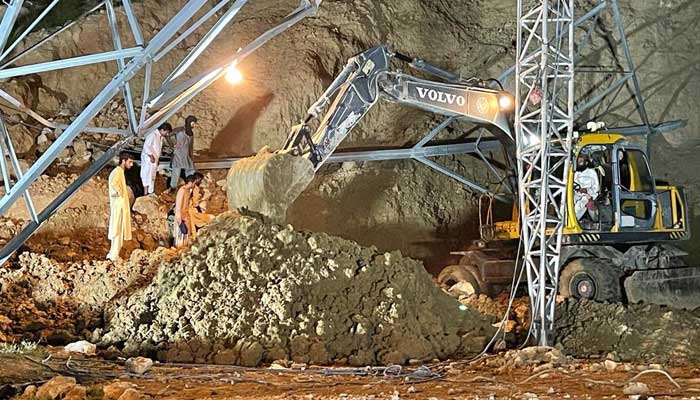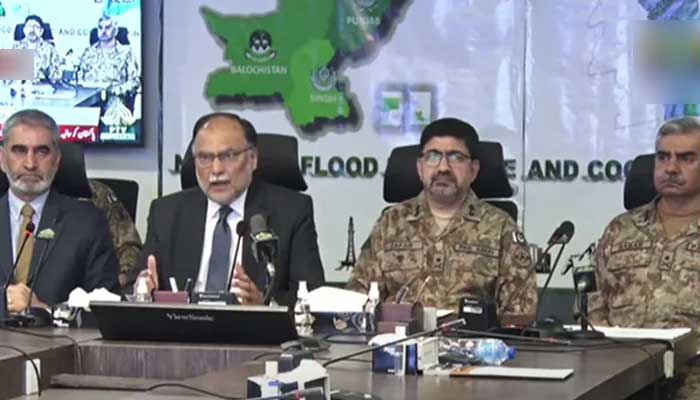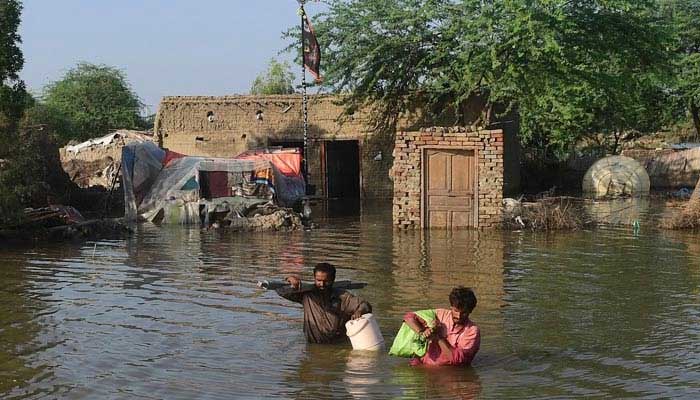Massive national efforts underway to bring back normalcy after floods: PM Shahbaz Sharif
Ahsan Iqbal calls on international community to help Pakistan cope with unprecedented floods
ISLAMABAD: As the catastrophic floods triggered by over 500% above average rainfall submerged one-third of Pakistan and claimed over 1,200 lives, Prime Minister Shahbaz Sharif says that massive national efforts were underway to bring back normalcy in the country.
Taking to Twitter, PM Shahbaz said, “A massive national effort is underway to restore essential services in the flood-hit areas.”
He maintained that National Highway Authority, Power DISCOs, Pakistan Telecommunication Authority (PTA) and other federal departments have done amazing work against the heaviest of odds and largely rehabilitated the damaged infrastructure.
In another tweet, the prime minister said that floods badly damaged power system in Sindh, Balochistan and Khyber Pakhtunkhwa.
He said it was a big challenge to provide power supply in the affected areas.
He felicitated Secretary Power Division Rashid Langrial and his team for incessantly working to ensure the restoration of power supply.
Pakistan seeks int'l support
In a joint press conference at the National Flood Response and Coordination Centre alongside military officials, Minister for Planning Ahsan Iqbal called on the international community to support Pakistan and assured the nation that the government — supported by its functionaries — would leave "no stone unturned" to bring normalcy back at the earliest possible time.
The planning minister also called on the international community to ensure that their resolve for support to Pakistan remains undeterred as the scale of the disaster warrants a major humanitarian response.
Statistics from the National Disaster Management Authority (NDMA) show that as of September 3, 1,265 people have lost their lives, 12,577 sustained injuries, 735,584 livestock were left dead, and 1,427,039 houses have been damaged.
Due to internal displacement, more than 500,000 people are currently living in relief camps across Balochistan, Khyber Pakhtunkhwa, Sindh, and Punjab.
Iqbal told the press briefing that Pakistan was facing one of the worst disasters caused by climate change and it was not to blame for it — as the country only emits 1% of carbon emissions, but is the seventh most vulnerable to climate catastrophes.
Rainfall over 500% above the normal mark has unleashed devastating floods across the country, he said, adding that over one million houses were damaged due to the floods.
The minister said that nearly 5,000km of roads were damaged, with the situation bleakest in Balochistan.
Nearly 10 days back, 14 critical highways that connect Balochistan to the rest of the country and are crucial for the economy, were not accessible due to heavy flooding, he said.
"I am pleased to say that our National High Authority, engineers from the armed forces, and the civil administration cleared 11 of the critical highways," he said, with continuous works underway to clear the remaining three.
The planning minister said that despite the intensity of the calamity, the authorities and institutions were working to ensure that connectivity is restored across the country.
Iqbal said that 81 grid stations were non-functional in the last 15 days, but after the expedited work, 69 have been restored and 12 will be functional soon — leading to the restoration of electricity in several parts of the country.
The federal minister said that 881 feeders were affected in some way or the other, resulting in the disruption of electricity. Among them, 758 have been made functional and 123 will be restored later.
Eight transmission lines were hampered, causing power outages, especially in Balochistan, he said, adding that six have been restored, while the rest will be restored soon.
The planning minister said that 3,500 telecommunication towers were damaged, which caused disruption in communication.
Services were down in the flood-hit areas for several days in the initial phase of the flooding, hampering rescue works as well, he said.
"Now, only 600 are non-functional, while the rest are fully functional."
He added that Prime Minister Shehbaz Sharif has directed authorities to ensure that the remaining telecommunication towers are restored within the next 48 hours.
The planning minister said that the PTA is working with relevant companies to make sure that the communication lines are restored at the earliest.
Army sets up 147 relief camps
Briefing the media on rescue and relief efforts by the armed forces, Director-General Inter-Services Public Relations (ISPR) Babar Iftikhar paid rich tribute to Balochistan Corps Commander Lt Gen Sarfraz Ali and others who were martyred in a helicopter crash while serving the nation amid floods.
Corps commander conferences held in July and August reaffirmed commitment to provide all possible help to flood affectees and Chief of Army Staff General Qamar Javed Bajwa gave special directions in this regard, he added.
“The army chief visited flood-affected areas and monitored the rescue operations,” the spokesperson said, adding that the army officials rescued people despite bad weather and other challenges.
“Army set up 147 relief camps across the country [to facilitate the flood victims],” Babar Iftikhar added. He maintained that 50,000 people were given shelter in relief camps.
Pakistan Air Force rescued over 1,521 people trapped in the floods, the military’s spokesperson said.
Urging people and philanthropists to donate to the flood victims, the army spokesperson said that 284 flood relief collection points have been established across the country.
Change in monsoon pattern
Chairman National Disaster Management Authority (NDMA) Lieutenant General Akhtar Nawaz said that monsoon rains began almost three weeks before their expected schedule and they were "unprecedented".
The NDMA chairman said that heavy rainfall was expected, but the downpour was exponentially above the forecast, resulting in extreme flooding across the country.
The rains — which were to occur in Khyber Pakhtunkhwa, Azad Kashmir, and northern areas — shifted from their traditional routes and occurred in Balochistan's eastern areas, Southern KP, Punjab's DG Khan and Rajanpur, and across Sindh.
"The rains were extremely heavy in Sindh, which led to an unprecedented situation," he said.
‘Work underway to restore telecom services’
Meanwhile, in a statement, the PTA said that continued efforts to restore connectivity in flood-affected areas have further reduced the affected mobile site count across the country to 568 (less than 1.1 % of total sites).
80 more sites have been restored in the last 24 hours and work is in progress for the complete restoration of telecom services in other areas on top priority, the PTA said.
The sites currently non-functional are mostly inaccessible and underwater due to floods, the statement said, adding “combined efforts are being made with respective civil and military authorities for access to underwater sites and dewatering”.
Floods and torrential rains had extensively damaged telecom infrastructure. The affected site count was 3386 (6.55% of the total sites across Pakistan) on the 28th of August 2022, which has been restored through tireless efforts by the maintenance teams of all telecom operators.
-
Security forces gun down 30 terrorists in multiple IBOs in KP: ISPR
-
MQM-P calls for new province in Sindh
-
US report validates Pakistan military edge over India: PM
-
Banned TTP poses serious threat to Pakistan security: UNSC panel
-
CM Afridi clarifies remarks on by-poll after ECP requests army deployment
-
Dubai sees 3.2m Pakistani passengers in 2025 as airport sets new milestone
-
Security forces kill 23 Indian proxy terrorists in KP's Kurram
-
Pakistan to construct island to boost oil exploration: report














